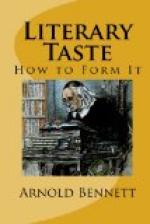Lamb is an instance of a great writer whom anybody can understand and whom a majority of those who interest themselves in literature can more or less appreciate. He makes no excessive demand either on the intellect or on the faculty of sympathetic emotion. On both sides of Lamb, however, there lie literatures more difficult, more recondite. The “knowledge” side need not detain us here; it can be mastered by concentration and perseverance. But the “power” side, which comprises the supreme productions of genius, demands special consideration. You may have arrived at the point of keenly enjoying Lamb and yet be entirely unable to “see anything in” such writings as Kubla Khan or Milton’s Comus; and as for Hamlet you may see nothing in it but a sanguinary tale “full of quotations.” Nevertheless it is the supreme productions which are capable of yielding the supreme pleasures, and which will yield the supreme pleasures when the pass-key to them has been acquired. This pass-key is a comprehension of the nature of poetry.
CHAPTER IX
VERSE
There is a word, a “name of fear,” which rouses terror in the heart of the vast educated majority of the English-speaking race. The most valiant will fly at the mere utterance of that word. The most broad-minded will put their backs up against it. The most rash will not dare to affront it. I myself have seen it empty buildings that had been full; and I know that it will scatter a crowd more quickly than a hose-pipe, hornets, or the rumour of plague. Even to murmur it is to incur solitude, probably disdain, and possibly starvation, as historical examples show. That word is “poetry.”
The profound objection of the average man to poetry can scarcely be exaggerated. And when I say the average man, I do not mean the “average sensual man”—any man who gets on to the top of the omnibus; I mean the average lettered man, the average man who does care a little for books and enjoys reading, and knows the classics by name and the popular writers by having read them. I am convinced that not one man in ten who reads, reads poetry—at any rate, knowingly. I am convinced, further, that not one man in ten who goes so far as knowingly to buy poetry ever reads it. You will find everywhere men who read very widely in prose, but who will say quite callously, “No, I never read poetry.” If the sales of modern poetry, distinctly labelled as such, were to cease entirely to-morrow not a publisher would fail; scarcely a publisher would be affected; and not a poet would die—for I do not believe that a single modern English poet is living to-day on the current proceeds of his verse. For a country which possesses the greatest poetical literature in the world this condition of affairs is at least odd. What makes it odder is that, occasionally, very occasionally, the average lettered man will have a fit of idolatry for a fine poet, buying




